
Researchers from St. Petersburg State University have designed a brandy analyzing device which can distinguish the ‘young’ drink from the seasoned one and even to distinguish among variants of brandy. This is of great help both to manufacturers and analysts on the hunt for counterfeits.
This ‘electronic tongue’ won't replace the cooper just yet but it is suited for routine work. The fun part - drinking - is still up to people.
The concept of ‘electronic noses’ and ‘electronic tongues’ are widespread in analyst circles but are sometimes confusing to laypeople. It means the device is intended…


